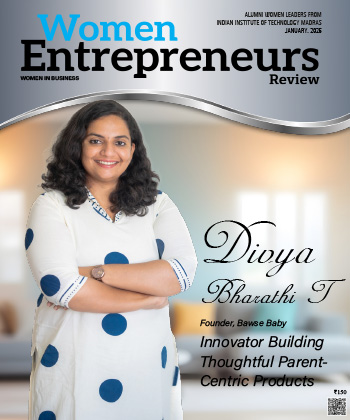
Innovating Finance Operations Through AI, Automation & Inclusion
By: Priya Narasimhan, Director - Finance Operations & Controls, Tesco Business Solutions
Priya Narasimhan is a seasoned finance transformation leader with over 20 years’ expertise in retail and global finance operations, driving process excellence, change management, and inclusive leadership across multi-country, multicultural environments in large-scale, matrix organizations.
In a thought-provoking interaction with Women Entrepreneurs Review Magazine, Priya talks about the intersection of finance and technology. She shares her insights on leveraging advanced technologies for making finance smarter & faster. Talking about the strategies leveraged by Tesco, she highlights the key challenges companies face while transitioning from legacy to digital platforms.
Priya also talks about leveraging automation and balancing innovation with governance to drive long-term value across global finance transformations.
To know more about Priya’s thoughts on the future of finance, read the interview below.
You’ve led finance transformations across countries. How are you using advanced technologies to make finance faster & smarter and what challenges do you face across in doing so?
We are continually reimagining finance operations by leveraging advanced technologies to drive significant efficiencies. This includes automating core processes like procure-to-pay cycles and enhancing invoice matching, which in turn reduces errors and accelerates our decision-making. By harnessing real-time data and sophisticated predictive analytics, we gain immediate, actionable insights into payment trends, enabling us to make informed, dynamic decisions on working capital.
However, this transformation isn't without its complexities, especially across a global organization of Tesco's scale. Transitioning from deeply embedded legacy systems to modern, intelligent platforms, particularly for high-volume operations, presents a significant challenge. It's not just a technical migration; it demands a fundamental shift in mindset and capabilities from our teams. While agility is crucial, maintaining strong foundational practices across diverse global teams can be a struggle.
To navigate this, we're committed to robust support, reinforcing core processes, and empowering our colleagues with the necessary tools and training to evolve and thrive in this digitally-driven environment.
Finance teams are moving from reports to predictions. How does your teams use data and automation better while keeping operations smooth across different finance areas?
Our focus is squarely on leveraging automation to transition finance from historical reporting to proactive prediction. We're actively identifying opportunities where new technologies can deliver tangible benefits, such as simplifying processes and generating predictive data insights across our operations.
For example, in customer to cash operations, automation will accelerate monitoring and safeguarding cash in stores, with predictive analytics to manage risks better.
To facilitate this evolution, we are deeply committed to fostering a culture of continuous improvement. We rigorously train and CI-certify our entire team, empowering them to drive innovation from the ground up. By embedding robust, consistent methodologies and discipline within our teams, we can effectively manage complexity, stabilize operations, and confidently embrace the future of finance.
In today’s changing world, finance must be fast but also follow rules. How do you keep operations agile while staying compliant and managing risks in large, global teams?
In a rapidly evolving global landscape, robust governance and compliance are paramount. Our strategy focuses on building highly standardized, process-led operations that are less reliant on manual intervention. Real-time monitoring and advanced automation are critical enablers here. We are actively piloting workflow tools to shift our Internal Controls (ICFR and SOX) from a detective to a truly preventative approach.
Agility, for us, means designing processes that are inherently scalable and repeatable, yet flexible enough to adapt quickly. Risk mitigation is embedded directly into our daily operations through metrics that prioritize accuracy, timeliness, and compliance.
Furthermore, we are investing in dynamic technologies and control frameworks that can seamlessly keep pace with changing regulatory environments, all while balancing operational efficiency and ensuring our finance teams remain highly capable and future ready.
Women leaders like you are shaping how AI is used in finance. How does inclusive leadership help teams handle AI changes better, and how do you promote this culture?
As organizations navigate the profound shifts brought by new technologies, inclusive leadership becomes more critical than ever. At Tesco, we define diversity broadly – encompassing not just gender, but a rich spectrum of ideas, experiences, backgrounds, and perspectives. This comprehensive approach to diversity is fundamental to fostering creative thinking and enhancing our teams' ability to adapt swiftly to disruption.
We actively cultivate a culture where every colleague feels genuinely heard, valued, and empowered to contribute as an active part of the solution. Our guiding principle, "treat others as you'd like to be treated," underpins all our team routines and interactions.
Complementing this, we run targeted programs focused on gender diversity and supporting underrepresented communities.
By embedding inclusion into every leadership and operational decision, we build truly open-minded and agile teams – a crucial factor in effectively leveraging and innovating with advanced tools.
And finally, we believe in leading by listening; often, the best ideas come from listening to our colleagues who are the experts at what they do. This becomes a prerequisite, especially when we want to embrace new technological advancements.
You’ve built diverse teams to drive innovation in finance. What are your key steps in growing strong, flexible teams that can support Tesco’s ongoing finance transformation?
Building robust, adaptable teams is fundamental to navigating Tesco's continuous finance transformation. Our strategy centers on three interconnected pillars: deepening technical capabilities, cultivating strong leadership, and fostering broad cross-functional exposure.
We actively encourage our colleagues not just to specialize within their finance domain, but also to embrace opportunities that stretch them horizontally across different functions. For instance, a move from payroll accounting to payroll operations, or from Financial Planning & Analysis (FP&A) to core property functions, significantly broadens their perspective and develops a more holistic talent base.
Beyond these experiences, we ensure a robust framework of support through structured career conversations and continuous feedback loops. We view talent retention as a direct outcome of nurturing both technical prowess and leadership potential.
Our unwavering commitment to inclusive policies, combined with consistent Continuous Improvement (CI) training and dedicated people development, has been instrumental in shaping the flexible, highly capable teams that are now leading our finance transformation journey at Tesco.
Great finance leaders balance rules and innovation. How can AI be used not just to save time but also to build long-term value and support real financial transformation?
AI presents an unparalleled opportunity to fundamentally transform finance, moving beyond mere automation to truly enhance our capabilities. Beyond driving significant efficiencies, AI excels at uncovering complex patterns, elevating the quality of our predictions, and optimizing strategic decision-making.
For instance, sophisticated analytical tools can dramatically accelerate invoice matching and provide deeper insights into payment trends, empowering us to proactively optimize working capital and seize new opportunities.
At TBS, we are strategically identifying high-value activities and reimagining our finance processes end-to-end, focusing not just on efficiency, but critically, on value creation. This long-term transformation leverages these advancements to shift our teams from transactional tasks to making impactful strategic contributions.
Ultimately, it's about empowering our finance professionals to drive informed decisions and actively pursue business growth opportunities across the organization.
Most Viewed
- 1 Women's Health Startup HerMD Closing Doors Amid Industry Challenges
- 2 5 Famous Women in Indian Armed Forces
- 3 Saudi Women No longer Require Male Permission for Clothing Choices, says Prince MbS
- 4 Kolkata Medtech Startup Innovodigm Raises Rs 5.5 Crore Seed Funding Led by IAN Group
- 5 Yamunanagar's Kashish Kalra Honoured after Securing 111th Rank in UPSC Civil Services Exam
- 6 Madurai Appoints Its First Woman Corporation Head
- 7 IAS Vijayalakshmi Bidari Appointed as the new Nagpur Divisional Commissioner
- 8 American Entrepreneur Lucy Guo Overtakes T Swift to become Youngest Female Billionaire
- 9 ICC Women's World Cup 2025 Trophy Showcased at Indore's Holkar Stadium
- 10 Aparna Saxena's Beauty Venture AntiNorm Launches in India
- 11 Vidya Nataraj Co-Founded BlueStone Jewellery & Lifestyle files IPO
- 12 5 Women Freedom Fighters of India
- 13 Dr. G Krishnapriya appointed as CEO for Trichy
- 14 M3M & Sirona Partner to Introduce Menstrual Hygiene Vending Machines in 15 Locations
- 15 Punjab Govt launches SHE Cohort 3.0 Supporting Tech-led Women Startups
- 16 Indian origin Lawyer, Sweena Pannu appointed as the US New Superior Court Judge
- 17 The Aurora Tech Award recognizes 4 Indian Women-led Startups
- 18 Kerala's Republic Day parade featured an all-female tableau
- 19 Manisha Kabbur Becomes Karnataka's First Woman International Karate Coach
- 20 Director K. S. Ravikumar's Daughter Maalica Ravikumar Launches Life Coaching Company 'Evergrowth Academy' for Women
- 21 Leezu's Raises Pre-Seed Funding to Accelerate Growth in Sexual Wellness Industry
- 22 Sattu: Super-easy summer drink for PCOS gut healing
- 23 Swathi Nelabhatla creates Sitha App, India's First Women-Exclusive Gig Platform
- 24 7 Timeless Female Kathak Dancers & their Iconic Legacies
- 25 Meet 7 Iconic Women Architects of Modern India & their Most Impactful Work
- 26 This Woman-led Insuretech Startup is Helping Bridge the Education Financing Gap in India
- 27 Women Leaders Share Lessons Learnt from India Women's WC Win
- 28 5 Enterprising Women Founders Powering Singapore's Tech & Innovation Landscape
- 29 4 Women. 4 Stories. One Vision for Smarter, Stronger Healthcare
- 30 Global Gender Gap Narrows to 68.8%, But Full Equality 123 Years Away: WEF Report 2025
- 31 Changemakers: 7 Women Entrepreneurs Taking the Make in India Movement Forward
- 32 Meet Lucy Guo, The Youngest Self-Made Female Billionaire Disrupting Tech
- 33 How Women are Driving India's Festive Online Shopping Surge






